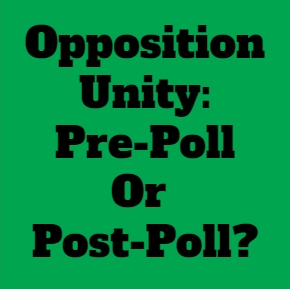

By Sunil Garodia
First publised on 2023-02-21 08:18:39
On Saturday,
Bihar chief minister and ally Nitish Kumar made an ostensibly simple request with the Congress party. Nitish asked the Congress' permission to go ahead and
start corralling opposition parties in a camp to forge opposition unity. But
the Congress took offence. On Sunday, the Congress came out with a statement
that said that it did not need reminding that it had to play a lead role in
opposition unity. For effect, it added that it had already started the process
with Rahul Gandhi's Bharat Jodo Yatra and the floor coordination exercise in
the Budget session of Parliament over the Adani issue. It further said that the
Congress allegiance to opposition unity cannot be questioned and it will
discuss the issue with all seriousness in the upcoming Raipur plenary session
of the party. The party also took pot shots at some opposition parties
(although, it seems, the reference was mainly for the TMC) which it said were "two-faced".
The
Congress, despite its bravado, knows that it is very difficult for the party to
take the lead in forging opposition unity. This is mainly due to the fact that despite
being anti-BJP, many regional opposition parties, like the TMC, the BRS and
AAP, are more concerned in protecting their turf and do not wish to accord any
importance to the Congress. That is why on Monday it said that opposition unity
will have to be via post-poll tie-ups as it believes that an all-encompassing,
pan-India opposition unity before the 2024 polls is difficult. It is good that
the Congress has, belatedly, recognized this fact. With Mamata Banerjee and K
Chandrasekhar Rao embarking on solo efforts to unite the opposition and with
many opposition parties willing to unite minus the Congress, the role which the
party can play in pre-poll opposition unity is not clear. In fact, given the
current situation, the Congress will likely turn some parties away from uniting
if it takes the lead.
But what
the Congress is suggesting - a post-poll alliance of like-minded parties - will
also not be easy to achieve. For starters, some regional parties will not agree
to give Congress the pole position even after the polls, more so if the number
of seats it wins is close to or lower than one or more such regional party.
Further, with several senior leaders in the fray, the question of leadership
will not be easily settled. Given the fact that BJP wins with just 37.36% of
the popular vote (as per 2019 Lok Sabha election figures), strategic pre-poll
alliances which do not divide the opposition vote is the best way to counter
the BJP. But presently, the fault lines in the opposition are too deep to make
that possible.











